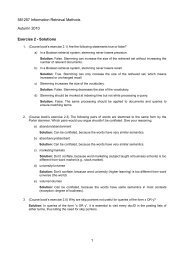Toni Sihvonen (order #92780) 62.142.248.1
Toni Sihvonen (order #92780) 62.142.248.1
Toni Sihvonen (order #92780) 62.142.248.1
Create successful ePaper yourself
Turn your PDF publications into a flip-book with our unique Google optimized e-Paper software.
<strong>Toni</strong> <strong>Sihvonen</strong> (<strong>order</strong> <strong>#92780</strong>) 6<br />
“They consulted how they might obtain help to avoid or repel the frequent fierce<br />
attacks of their northern neighbors, and all agreed with the advice of their king,<br />
Vortigern, to call on the assistance of the Saxon Peoples across the sea.”<br />
Bede, Ecclesiastical History of the English People<br />
This timeline for fifth century Britain adds six new<br />
Historical Phases prior to the five phases of Arthur’s reign<br />
described in The Boy King. Periods already covered by<br />
The Boy King are abbreviated, or are limited to a Saxon<br />
view of the same events. Use this chronology to run<br />
adventures before Arthur, and to understand the background<br />
of Arthur’s Saxon wars.<br />
The Mythic Age<br />
A Long Time Ago<br />
In the Mythic Age gods and giants walked the earth and<br />
great dynasties were founded. The age has no fixed date:<br />
it is always “back before back before.” A Saxon account<br />
of the Creation and the gods appears in the “Magic” section<br />
of the previous chapter.<br />
The Mythic Age overlaps with The Roman Age (below).<br />
The Saxons remember Attila the Hun as Etzel, husband of<br />
the warrior-queen Kreimhild. The Britons mythologize<br />
the Roman usurper Magnus Maximus as the visionary<br />
chieftain Macsen Wledig.<br />
The Roman Age<br />
55 BC - AD 399<br />
For centuries, the Romans and Celts dominated Western<br />
Europe, finally united under the Roman Empire, which by<br />
the second century AD governed Gaul, Britain, and all the<br />
rest of Celtic Europe save Ireland. In Romano-British cities<br />
like Camulodunum the Celtic and Roman gods mingled in<br />
the Imperial Temple as naturally as their worshippers<br />
strolled together in the forums, markets, and baths outside<br />
it. By then, both peoples wore togas, spoke a patois<br />
of Celtic and Latin, and learned mores from the<br />
Mediterranean - like the new ideas of their fellow<br />
Roman subject, Jesus Christ.<br />
The German or Gothic tribes entered Western Europe<br />
long after the Romans and Celts. They arrived as nomadic<br />
warriors: not tied to cities or farms: crafty from hunting<br />
and huge from a diet of meat: sending excess sons to conquer<br />
their neighbors: total strangers to Christianity and<br />
civilized mores. Their languages were but distant cousins<br />
of Latin and Celtic: likewise their gods, who still demanded<br />
absolute piety and human sacrifice. Unable to easily<br />
assimilate these new barbarians, the Romans hired them<br />
as federates, taught them mass warfare, and resettled<br />
them to defend Roman croplands against their own kind<br />
- with disastrous results when the federates’ pay ran<br />
short. Weakened by internal wars, Rome lost to the<br />
Germans, and its Celtic client-kings lost with it.<br />
55-54 BC: Julius Caesar invades Britain twice, but does<br />
not occupy it.<br />
AD 9: Three Roman legions (over 12,000 men)<br />
ambushed and slain by the German chieftain Arminius at<br />
Tuetoberger Wald. The loss forces Emperor Augustus to<br />
cancel his planned invasion of Britain.<br />
43: Claudius begins Roman occupation of Britain.<br />
122: The b<strong>order</strong>s of Britainia are established for the next<br />
1,300 years. Rome controls everything south of Solway<br />
Firth: the Picts to the north are badly beaten but not conquered,<br />
so Emperor Hadrian builds his Wall to seal them<br />
off.<br />
190-211: Legions in Britain proclaim its governor, Clodius<br />
Albinus, as Emperor, while legions on the Danube frontier<br />
elevate the general Septemius Severus. The two emperors<br />
fight for many years until Severus wins in 197. He stocks<br />
Britain with loyal soldiers and, for the first time, permits<br />
them to marry local women, recognizing their children as<br />
citizens. During his reign, the first British saint, Albans, is<br />
martyred at Verulamium for defying a Roman magistrate<br />
in 208. Severus dies at Eburacum in 211.<br />
c. 275: Saxons begin to raid Britain. To discourage them,<br />
Romans build the Saxon Shore forts in the southeast,<br />
under the Comes Litoris Saxonici (“Count of the Saxon<br />
Shore”). Meanwhile, Pids and Irish raid the north and<br />
west. Despite this, many rich Gauls emigrate to Britain,<br />
because civil wars have left Gaul weakly defended.
















